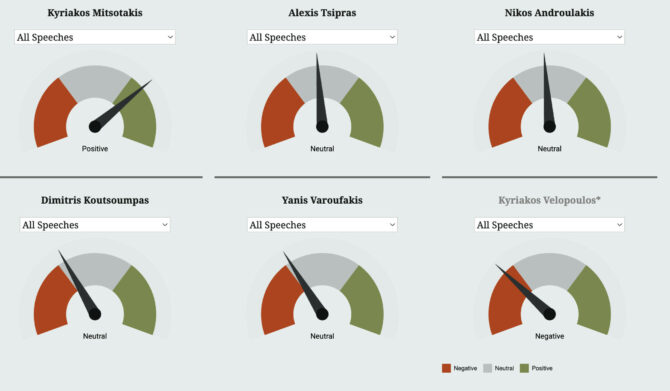The decrease of the polarization and populist discourse patterns decrease and the issues that political leaders raise either as programmatic cutting-edge positions or as part of criticism towards their political opponents.
The findings from the analysis of political speeches in the first round of elections in May, 21st 2023

See the analyses of all the speeches of the leaders of the parliamentary parties before the elections of 21 May 2023.
The first half of the ongoing election period has already passed, and political leaders are intensifying their efforts with visits and speeches nationwide. Initially, there was a lack of mobilization during the first week, but this has changed as more speeches are now being delivered in the second week.
Kyriakos Mitsotakis’ campaign speeches maintain a clearly positive emotional tone, which at times surpasses the overall atmosphere of the previous election period. It can be reasonably assumed that the significant victory achieved in the previous elections contributes to this positive outlook. On the other hand, both Alexis Tsipras and Nikos Androulakis’ speeches fall within the neutral spectrum, devoid of any extreme emotions. The situation is similar for Dimitris Koutsoumbas, except for his thematic speech on the environment where he veered towards the negative spectrum, likely due to his strong criticism of the prevailing environmental policies and the green transition. Conversely, Kyriakos Velopoulos’ speeches consistently foster a negative emotional atmosphere.
No use of populist discourse by Alexis Tsipras in this campaign period – Decreased utilization of polarization by Androulakis
Kyriakos Mitsotakis has displayed remarkable consistency in his speech strategy, particularly regarding the indicators of polarization and populism. Throughout this period, there have been no observed escalations in either dimension. On the other hand, an important distinction in Alexis Tsipras’ speeches between the two election periods is the significant reduction in patterns of populist discourse. It can now be stated that during the second period, there is no observable use of populist discourse that necessitates further analysis. The utilization of polarizing schemes has also diminished compared to the previous election period, although not to the same extent as the employment of populist schemes. A comparison of the two election periods reveals a decreased utilization of polarization by Nikos Androulakis as well. The only speech in the second period that includes instances of polarization is the one delivered in Volos. Concerning populism, there is a generally consistent and limited use of such rhetorical schemes. Compared to the previous election period, the levels of polarization in Dimitris Koutsoumbas’ speech are also lower, although he remains the most polarizing speaker in this period. In terms of populism, isolated instances of populist rhetorical patterns can be identified, but a fully developed populist speech strategy is absent. Kyriakos Velopoulos’ speeches do not present anything noteworthy in terms of either of the two indicators.
How we analyze the campaign speeches of political leaders

The working methodology for analyzing campaign speeches in the project -from data collection to data analysis.
Detecting polarization in the pre-election political discourse in Greece

Differentiating competition, division and polarisation in political discourse.
Tsipras’ speeches continue to be a combination of programmatic agenda and criticism of opponents; Androulakis’ speeches also lean more towards the programmatic aspect
In this second electoral period, Kyriakos Mitsotakis consistently maintains an emphasis on programmatic discourse, with similar percentages compared to the overall pattern of the previous period. Notably, every speech delivered by Mitsotakis up to this point has exhibited this characteristic. Similarly, there are no significant changes in the nature of speeches by other political leaders. Alexis Tsipras’ speeches, as a general trend, continue to be a combination of programmatic agenda and criticism of opponents, although there is a slight emphasis on the programmatic dimension.
Nikos Androulakis’ speeches also lean more towards the programmatic aspect. During his speech in Chalandri and the thematic event on health, Tsipras dedicated more time to presenting SYRIZA’s governmental program, while in his speeches in Larissa and Nea Ionia, Magnesia, he shifted the focus towards criticizing his opponents. On the other hand, both Dimitris Koutsoumbas and Kyriakos Velopoulos dedicate a significant portion of their speeches to criticism. The exception for Dimitris Koutsoumbas was his speech in Neo Monastiri in Fthiotida, where his focus diverged from criticism to other aspects.
Economy, work and health are the key focus areas for Mitsotakis and Tsipras – Androulakis’ speech centers around agricultural policy, education, and energy
In terms of the topics that each political leader addresses, we can observe some changes. This week, Kyriakos Mitsotakis’ speeches have once again centered around the key focus areas: “economy-work-health,” which were also prevalent in the previous election period. However, a notable difference arises as the issue of national security gains greater prominence and becomes the primary focus of his criticism in a specific speech. This shift can be attributed to the recent public discourse surrounding the electoral behavior of the Muslim minority in Thrace, which has garnered significant attention in recent days.
Similarly, Alexis Tsipras incorporates the same key focus areas in his speeches, which have proven to be central to both electoral processes. These topics serve both as programmatic goals and subjects of his criticism towards political opponents. Additionally, Tsipras directs his critique towards policies related to transparency and housing. It is worth mentioning that in certain events, such as the health-themed event and the speech to trade unionists, specific topics such as health and labor are emphatically highlighted. Lastly, the presentation of the government’s program predominantly revolves around the topic of the economy.
The PASOK president’s program speech currently centers around three key topics: agricultural policy, education, and energy. The location of each speech plays a significant role, with agricultural policy taking precedence in Magnesia and energy in Arcadia, the country’s second most important energy center after Western Macedonia. However, there is consistency in his criticism, which primarily focuses on the economy and health.
The general secretary of the Communist Party (KKE) exhibits a more diverse range of topics in his discourse compared to previous days. The main recurring themes include the economy, labor, energy, and the environment. However, there is a notable difference in his speech in Elatia, Fthiotida, where the issue of elections and the upcoming ballot takes center stage, which is a departure from his usual focus. Additionally, in this particular speech, he extends his criticism to include infrastructure and agricultural policy, which are not commonly prioritized to such a degree. On the other hand, Kyriakos Velopoulos primarily concentrates on the issues of the economy and corruption in his speeches.
Kyriakos Mitsotakis refers to the Recovery Fund; Alexis Tsipras makes multiple mentions of the healthcare system
The consistency observed in Kyriakos Mitsotakis’ speech strategy is also reflected in the specific references made in his speeches. The only notable reference that stands out this week is the mention of the Recovery Fund, which is clearly tied to the programmatic discourse presented by the President of the New Democracy party. Any other explicit mentions of other political figures are extremely limited or completely absent.
On the other hand, Alexis Tsipras has once again increased his references to Kyriakos Mitsotakis, as the latter remains the only politician mentioned by name by the president of SYRIZA. It is particularly noteworthy that in all his speeches this week, Alexis Tsipras made multiple mentions of the healthcare system in Greece and related concepts such as hospitals, ambulances, and primary healthcare. Additionally, in his address to social groups, there was a stronger emphasis on including workers, and his speech to representatives of trade unions played a decisive role in this regard. References to the healthcare system in Greece were also consistently made in Nikos Androulakis’ speech, while mentions of the founder of PASOK, Andreas Papandreou, remained constant. Nikos Androulakis remains the political leader who refers to Kyriakos Mitsotakis the most in this election period, with references to Mitsotakis being twice as frequent as those to Alexis Tsipras. In Dimitris Koutsoumbas’ speeches, frequent references to the European Union, the Recovery Fund, and NATO can be found. Many policies of the country’s top three parties (ND, SYRIZA, PASOK) are associated with these international organizations and their demands.
